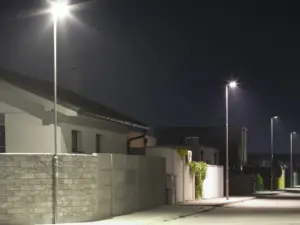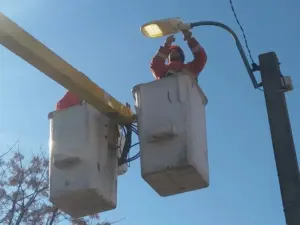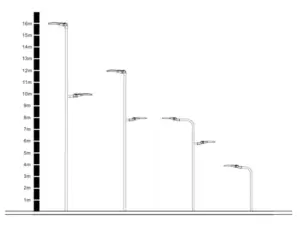Giriş:
Street lighting has a vital role to play. They are critical in communities, localities, or public places. Street lights provide safety for all. But do you know the street lighting design standards? Yes! You read it right! There are some set standards that everyone should keep in consideration.
These standards take care of set regulations, energy savings, and efficiency. Street lighting design standards discuss performance, design, systems, and more. We will talk about it in detail in this blog. So, let us explore!
Why Follow Street Lighting Design Standards?
Before discussing standards, we must know why we need them. Many reasons highlight their importance. We need these safety standards for several reasons. It includes safety, sustainability, and functionality.

-
Safety
The point of safety comes first in the discussion. With proper design and standards, these lights offer visibility. Hence, it reduces crime, accidents, and other incidents. Also, bright and even light helps road users to see the road and navigate well regardless of the time.
-
Sustainability
Streetlights play an essential role in promoting sustainability. They are an energy-efficient solution that one should include in one’s life. Moreover, with the right use of LED fixtures and smart controls, we can save costs. Also, it helps lower energy consumption and lower the environmental footprint.
-
Appeal and Charm
By using street light design, we can add a touch of charm and appeal to urban spaces. You can add any element of your choice and make changes. These can adapt to color temperature, glare control, and placement.
Thus, these are some reasons you should follow street lighting standards. Let us now know about some street lighting design standards.
Street Lighting Design Standards You Should Know
Compliance with Regulations:
You have to keep regulations in check. Thus, one should consider proper national or regional standards. These standards are by the Illuminating Engineering Society (IES) or local building codes. Such organizations give us lighting levels, glare control, and energy efficiency guidelines.
Safety Consideration:
Always keep safety in the first place, even before street light design. Following safety norms will keep everyone safe around. Also, it will help pedestrians, cyclists, and motorcyclists with uniform light. Hence, it will play an important role in road safety.
Input:
Getting input from people is essential. Feedback helps us reach a better decision. Consider talking to local people and residents. Also, ask businesses for their suggestions. In this manner, you will reach common solutions and meet community standards.
Sustainability:
It would help if you always kept energy efficiency and sustainability in check. These days, there are so many solutions that meet such standards. Hence, selecting such solutions will ensure that you lower the environmental impact. Also, it will help in reducing energy costs. Keep these solutions in mind when sustainability is your choice.
Ease of Maintaining:
How long would you wait for an expert to arrive if there is some problem? Ease of maintenance is essential when it comes to street lights. Always choose street lights that are easy to take care of. Easy-to-sort features will reduce downtime and provide continuous lighting.

Level of Illumination:
What will be the role of a street light if it does not provide enough light? Also, one needs to select a light per the location in which we are putting it. For residential locations, we need light of around 10 lux. Moreover, it is different for some places. It would help if you had higher levels of about 15 lux or more for commercial places. Please keep it in the notice for street light design.
Even Light Distribution:
Even light distribution is always a better choice. Why? It offers uniform visibility to users on roadways and sidewalks. It not only avoids mishaps but also provides a clear vision. Proper distribution of lights reduces contrasts and improves visual comfort.
Glare Control:
Glares can be a problem with proper visibility. By minimizing glare from the street lights, you can reduce discomfort. Hence, choose streetlights that do not cause discomfort to people.
Color Temperature:
One should choose lights that match the environment. Go for the right color. An ideal color temperature should be as per the environment. Thus, choose warm color temperatures (2700-3000 Kelvin) for pedestrian areas. For high-speed roads, go for cooler temperatures of about 4000 Kelvin or higher.
Light Distribution:
Proper light distribution plays an important role. Make sure that light distribution is even all across while installing. With proper distribution, light pollution is not there, and we save energy.
Height of Light:

The height at which we place the light is essential. Are we placing it too high or too low? Is it in a perfect position? These questions are important for you to keep in mind. Mounting height or where you place the light is the solution. Thus, with proper mounting, you can ensure even lighting.
Spacing:
Do you know that there are also some standards for spacing in lights? Yes! One can make the distribution even between light fixtures. It will bring uniformity and distribute light well. There are also some specific patterns that one can follow for spacing and geometry.
Shielding:
Sometimes, we can also use shielding and similar techniques. The main idea behind using this technique is to resist light glare. One can use cutoff fixtures and the right shielding to prevent light spilling. It will not disturb your neighbors from excess lighting.
Material Selection:
Always go for durable materials when you are installing street lights. Thus, choose durable and corrosion-resistant materials for street lighting. It will give you long-term stability. Thus, there will be no need for you to install the lights again. You can go for materials like aluminum, steel, or other durable materials.
Voltage Selection:
We cannot overlook voltage selection at any cost. You should go for the right voltage that works for streets. Also, the voltage will depend on the type of project and the electrical equipment you will use. Keep in mind that low voltage is good for smaller projects. Also, for large projects, a higher voltage is good.
Control Systems:
The standards are changing as technology grows. Thus, you can also choose different options as per your choice and decision. Go for options that provide control systems to manage light as per the use. It should provide features like dimming, timers, and even photocells. Today, you will also get some smart light controls. These controls will allow you to adjust levels as per the real-time conditions.
Protection from Surge:
We should also keep this factor in consideration. Sometimes, there is an uneven or sudden surge of electricity. Things like voltage spikes or lighting strikes can damage street lights. Hence, you should select lights with surge protectors. Surge protection prevents any type of electrical damage and gives a long life.
Wiring:
How can we not talk about wiring? Wiring is one of the most crucial aspects of street lighting design standards. Keep in mind to use the right cable size and type when installing. You can protect your lights from electrical hazards and voltage drops with wiring.
Grounding:
There are many instances when poles fall where the light is present. In such instances, people around can sustain injury. Thus, checking proper grounding is one of the most essential points to consider. Also, with proper earthing, electrical currents can move to the ground. Also, it reduces the risk of any shock or fire.
Good Aesthetics:
You can always include good aesthetics and charm in the lights. What wrong is there in it to provide some good appeal to the street lights? It will only enhance the beauty of your neighborhood. So, as per the surrounding environment, you can make changes and modifications. Adding a touch of charm is always a good choice.
Impact on Wildlife:
While we are making our lives easier, we need to take care of others, too. Keep in consideration reducing light pollution to as little as possible. These lights should not disturb nocturnal animals and birds. Proper shielding, direction, and intensity can help control this.
Emergency Options:
Are you ready for an emergency? Do the street lights have backup when there is a power cut? Keeping such points in consideration always helps. Keep a check on the point that the lights that you are using should have backups. It will work for you when there is a power cut.
Future Ready:
Are you ready for changes? Are your street lights ready for changes? Go for lights that can tolerate adaptation to changing technology. We will get different choices for bulbs, wires, etc. You will be able to integrate those changes well. It is only possible when the lights are ready for the future.
Sonuç:
Now, do you know how to design street lighting? These are street lighting design standards that you should always keep in mind. We are living in a world full of technology. There are so many options available around us. So, why not make the best decision after thorough research? This discussion will help you in making the right choice in street light design.
